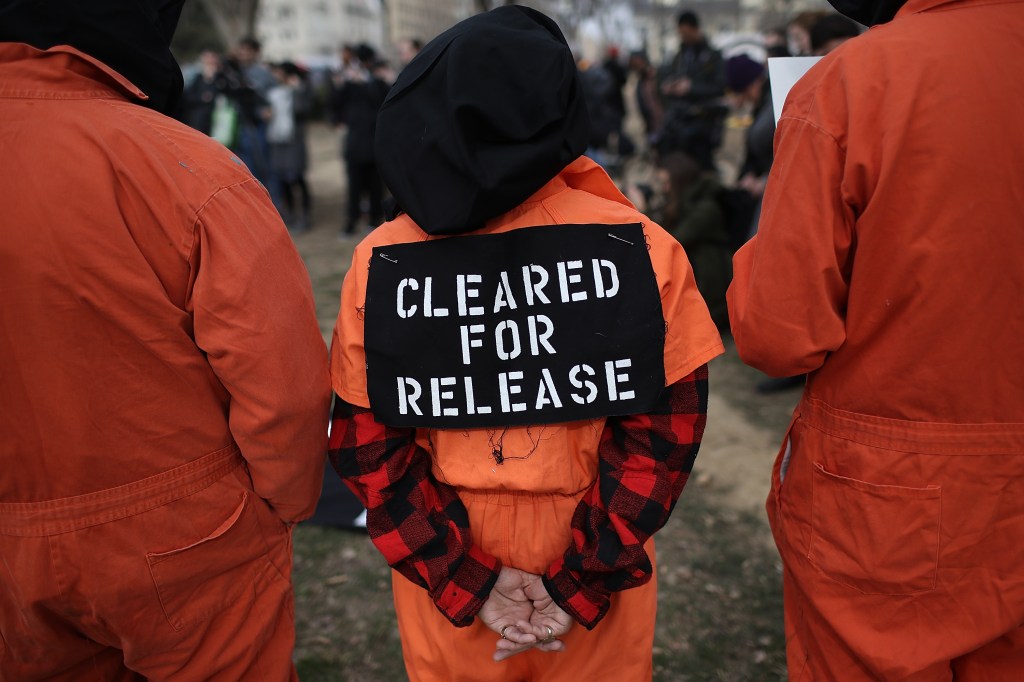The U.S. government is trying to transfer a U.S. citizen captured in Syria and detained in Iraq to Saudi Arabia in a case that challenges America’s post-9/11 war powers and the right suspected terrorists have to due process.
In September 2017, an unnamed U.S. citizen referred to only as “John Doe” surrendered to Syrian militia and was subsequently turned over to the U.S. military. He was identified as an “enemy combatant,” accused of being an Islamic State fighter, and sent to a military prison in Iraq.
Videos by VICE
For the past seven months, Doe has been detained at a secret prison site in Iraq without charge while the Justice Department struggles to figure out what to do with him. The government doesn’t want to release him, but reportedly hasn’t been able to gather enough admissible evidence of his alleged fighting for the Islamic State to try him in criminal court, according to the New York Times.
The ACLU says the Trump administration is unlawfully holding an American citizen, and that the man should either be formally charged with a crime or released. But the Trump administration disagrees, saying it has reached a diplomatic agreement with another country to take care of it.
In the past, enemy combatants have either been sent to Guantanamo or tried in U.S. courts. But no one has been sent to Guantanamo since 2008, and the FBI reportedly doesn’t have enough evidence to get a conviction in this case. That leaves one more murky option for the U.S. government if they don’t want to release him, which is to find out if another country can prosecute him.
“The Trump administration has been detaining this American citizen unlawfully for more than seven months, and forcibly rendering him to another country would be an unconscionable violation of his constitutional rights,” an ACLU attorney, Jonathan Hafetz, said in a statement to the New York Times. “He should either be charged or freed, not handed over to an unnamed foreign government.”
After rumors surfaced that the administration was engaging in negotiations to transfer Doe somewhere else, a federal judge ordered the government in January to notify the ACLU 72 hours before they intended to transfer him. The U.S. government filed a notice Monday evening, which the ACLU quickly challenged, arguing “it would make a mockery of the Great Writ if the executive could now strip this American citizen of his right to seek his freedom by rendering him to the custody of another country without established legal authority.”
The ACLU argues that for the U.S. to label someone as an“enemy combatant” and therefore have the right to detain them, the government has to prove that that the individual fights for a group against which the U.S. is in conflict.
Despite the billions of dollars and thousands of airstrikes, whether the U.S. is in an official and lawful conflict with the Islamic State is actually a murky question. The Trump administration, like the Obama administration, has used the 2001 and 2002 Authorization for the Use of Military Force (AUMF) to justify its full-fledged war on the Islamic State in countries ranging from Syria to Iraq to Libya.
But the AUMF doesn’t actually mention ISIS, because it hadn’t been formed yet.“The fact that the government has no authority to detain ISIS members also means that its incorrect allegations against our client are irrelevant,”Hafetz wrote in a blog post. “Before this case, no court had considered the legitimacy of the government’s claims that it is authorized to use force against ISIS. However, rather than wait for a ruling, the government prefers to wash its hands of the matter by illegally and forcibly rendering him to another country.”
The government argues that for diplomatic and security reasons, “it’s it is imperative that the transfer occur quickly and smoothly,” but the federal judge who heard arguments Thursday has yet to make a decision.
Cover image: WASHINGTON, DC – JANUARY 11: Activists dressed as detainees from the Guantanamo Bay detention camp protest in front of the White House January 11, 2018 in Washington, DC .Today marks the sixteenth anniversary of the opening of the detention facility (Photo by Win McNamee/Getty Images)
More
From VICE
-

Apple AirTag clipped to a backpack — Credit: Photo by James D. Morgan/Getty Images -

Illustration by Reesa -

Screenshot: Sunblink -

Screenshot: Big Fan Games
